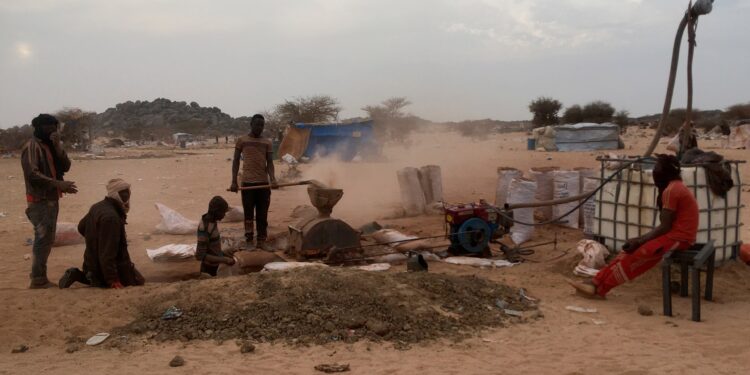1/13/2025–|Last updated: 1/13/202507:45 PM (Mecca time)
Reuters said that, yesterday, Saturday, the Malian authorities began transporting gold stocks from the Loulo-Gonkoto site of the Canadian company Barrick Gold using helicopters.
Four informed sources reported that about 3 tons of gold had already been transferred, and the value of this amount was about $245 million, according to one of the sources.
This action comes amid a long-standing dispute between the Canadian mining company and financial authorities.
In a memo sent on Sunday to the company’s employees in Mali, Barrick Gold indicated that the military-led government had begun executing an order to confiscate gold stocks located at the complex, and the company explained that this move could lead to the suspension of operations at the site.
The place to which the gold was transferred was not revealed, and no official comment has been issued yet by Barrick Gold or the financial authorities regarding this development.
Reuters notes that the dispute between the company and the Malian government may threaten the continuity of operations at the site. The Loulo-Gonkoto site is among the major mining projects in Mali, and this development may cast a shadow over the country’s mining sector.
Barrick Gold owns 80% of two companies affiliated with the Loulou Gonkoutou gold exploration group in Mali, while the Malian state owns the remaining share.
In August 2023, Mali adopted a new mining law that allows the state to take a share of up to 30% of new projects, and the legal reform also removed tax exemptions granted to companies.
Barrick Gold, one of the foreign groups that dominate the mining sector in Mali, acknowledged the occurrence of tensions with the financial authorities last July, without specifying their nature.
This comes in light of the rule of the military junta in Mali and accusations that it is establishing relations with Russia. This is a shift witnessed by several countries in Africa that have distanced themselves from the West, especially France, whose influence in the African continent has declined.
The leader of the military junta in Burkina Faso, Ibrahim Traoré, announced early last October that his country plans to withdraw mining licenses from some foreign companies, and seeks to produce more of its own gold.
Traoré said, in a radio speech at the time on the occasion of the two-year anniversary of his seizure of power, “We know how to extract our gold, and I do not understand why we allow multinational companies to come and extract it,” while reports say that “the complexity of the work of foreign companies is due to increasing insecurity.”
In early July, Niger, Mali, and Burkina Faso, three countries in West Africa led by the army, also signed a “confederation” treaty, outside the Economic Community of West African States (ECOWAS), urging them to return to democratic rule.



